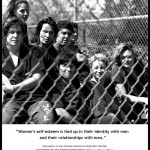He concluded:
Many compounding factors lead women to prison, starting early in life: outdated policing strategies, underfunded mental health systems, and draconian sentencing practices and laws.
Recently, we have witnessed overbearing law enforcement in the minority communities of Ferguson, MO and Baltimore. I have begun to think that women are being mistreated in the same manner.
My daughters and the daughters of friends who have come into contact with local law enforcement report common themes. Their cell phones are seized, which feels like a personal violation. If they try to prevent this violation, they are threatened with obstruction of justice charges. Women stopped for suspected traffic violations are immediately ask for permission to search their car without probable cause. If they decline, they are threatened with arrest.From their experiences, I began to understand that Tulsa law enforcement, and maybe the rest of the country, is mistreating women and contributing to the high rate of arrest and incarceration of women.
Martinez believes this is only a small part of the problem. Most women involved in the criminal justice system are suffering from untreated trauma, mental illness and or drug addiction. They are homeless, unemployed and oftentimes victims of domestic violence. They have on average two to three children. Once they enter the criminal justice system, they are assessed with multiple fines and fees, most of which support the criminal justice system itself. If they are arrested, jailed or sent to prison, they rarely receive services to address any of the issues that entangled them in the first place. The state of Oklahoma also enforces sentencing enhancements, mandatory minimums, and harsh drug laws that result in unnecessary felony convictions and long prison sentences for non-violent women.
The system perpetuates itself in peculiar and unjust ways, he believes. For example, once a woman is charged, it becomes extremely difficult to secure a job, even if she is never convicted. She becomes unemployable. Even in cases where charges are dropped or deferred, women still face huge employment hurdles. This cycle pulls women into poverty and drags their children down with them. Entire families and communities become lost in a vicious cycle of poverty and incarceration.
Martinez reached out to Mimi Tarrasch, executive senior program director of the Women in Recovery Program at Family & Children’s Services, to better understand the issues. Women in Recovery helps about 100 women at a time break the cycle of incarceration. The program is an intensive outpatient alternative to incarceration for women who are not eligible for other diversion programs. It ensures women receive substance abuse and mental health treatment, trauma intervention, education, workforce readiness training, family reunification services, comprehensive case management, supervision, and safe housing. Families and children are integrated into the program. In short, it focuses on structure, safety and accountability.
The return on investment in this program has been significant. Today, there are close to 7,000 children with mothers in Oklahoma prisons. Those children are four to seven times more likely to be incarcerated themselves. He cautions:
If you remember only one thing, understand that incarceration has devastating impacts on children. It affects their education, health and life’s outcomes.
Women in Recovery provides its clients and their families stable housing and treatment to ease the transition to a “normal” life. But more important, they are trained to rejoin the work force. The program provides training for sustainable careers that will allow women to support themselves and their families.
Women in Recovery and similar programs need Tulsa’s good corporate citizens to commit to partnering with service organizations to provide employment and in some instances on-the-job training. A number of prominent Tulsa businesses already have committed to improving the lives of justice-involved women, but we need more. You do not have to be a big business to make a big impact.
Don’t let our women continue to be victims of reckless law enforcement and punitive criminal justice policies. Let’s commit to helping the ones that have been unjustly caught in this trap by helping them learn to live a positive life.










